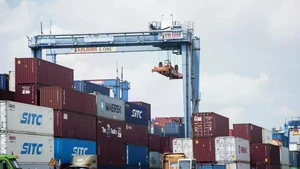Concerns and expectations of household businesses at a policy turning point
Decree 70 marks an important step in the tax reform roadmap, gradually replacing the long-standing lump-sum tax regime. Under the new rules, from 2026, household businesses will need to manage revenues and expenditures, issue e-invoices, and make periodic tax declarations instead of paying a fixed monthly tax as before. This means small traders and businesses will have to overhaul their management methods, shifting from manual bookkeeping to digital tools.
At a recent seminar in Ha Noi, many participants openly voiced their concerns. Nguyen Van Hang, a small trader selling accessories at Dong Xuan Market, said: “I’m used to keeping handwritten records, so having to use cash registers, software, and e-invoices is daunting. I also worry about the extra costs of buying new equipment.” This sentiment is shared by many middle-aged business owners accustomed to traditional practices.
Not only Hang but also thousands of household businesses at Dong Xuan Market, home to more than 2,200 traders contributing about 67 billion VND in annual tax revenue, are facing the same challenge. Nguyen Ha Thanh, Deputy General Director of Dong Xuan Market JSC, emphasised: “Traditional markets like Dong Xuan have a major opportunity for renewal, but they need strong support from technology and policy. The adoption of digital payments and e-invoices will not only make traders’ operations more transparent but also enhance their credibility, giving them a competitive edge over modern retail channels.”
From a local management perspective, Nguyen Hong Trang, Vice Chairwoman of Hoan Kiem Ward People’s Committee, noted: “Our ward has thousands of household businesses, many in services and tourism. This group both creates jobs and contributes to the budget, but is also under the greatest pressure to adapt quickly to Decree 70. Grassroots authorities need close coordination with banks, fintech firms and tax agencies to provide direct support.”
On a more positive note, many experts consider this an opportunity to shift business mindsets. Le Yen, Director of Hanoitax, a tax consulting firm, explained: “Long-standing habits make many hesitant, but by moving towards transparent tax declarations, they will find it easier to access capital, expand their businesses, and avoid legal risks. It is a chance for small traders to break out of the ‘closed circle’ of petty trading.”
Clearly, the same policy can be seen either as pressure or as opportunity. The decisive factor lies in how implementation is organised and what supporting ecosystem accompanies it.
Multiple solutions to support small traders
To help household businesses through this transition, various technological and financial solutions have been introduced. What they share in common are simplicity, ease of application, and affordability - key factors for quick adoption by traders.
Vu Quynh Huong, Marketing Director of 9Pay said: “To ensure household businesses and small enterprises are not left behind, fintech solutions must focus on simplicity, ease of use, and affordability. 9Pay has developed a multi-functional payment gateway that supports e-invoicing, banking connections, and is especially optimised for small-scale transactions at traditional markets and tourist shops.”
She added that 9Pay not only provides QR code payments, e-wallet and international card integration, but also enables direct payments from foreign customers via booking systems, and supports automated disbursements to hotels, restaurants, and tour guides. “This is particularly important for Hoan Kiem’s tourism businesses, where thousands of small-value transactions occur daily, yet these can make or break the visitor experience,” she stressed.
Luu Van Hoa, owner of a small hotel on Hang Be Street, raised a practical concern: “My hotel mainly receives international guests through booking apps like Booking, but we don’t have our own payment system or IT staff. Is there a way to receive deposits directly from overseas guests into Viet Nam safely and quickly?”
A representative of a travel company at the seminar added: “Tourism requires countless small payments to restaurants, hotels, guides, and transport providers. Doing this manually takes a lot of time and is prone to errors. Is there a way to automate these payments?”
Such concerns show that fintech not only provides payment tools but also helps reshape cost management and improve operational efficiency for small enterprises.
Alongside fintech, banks have also pledged support. BacABank and PGBank have introduced preferential credit packages, under which household businesses and small enterprises practising financial transparency through e-invoicing will receive priority approval. This marks an important shift, as transparent declarations can now serve as the basis for accessing capital, rather than relying solely on collateral.
Analysis at the seminar suggested this could create a “new cycle”: the more transparent the business, the easier it is to access credit, thereby generating resources for expansion. This, in turn, motivates traders to embrace change proactively rather than passively.
Local authorities have also proposed that the government consider initial cost-support packages, particularly for micro-businesses. This would ease the financial burden of investing in software or equipment, encouraging traders to step confidently into the transition process.
The reality highlights two sides of the issue: on one hand, concerns about costs, procedures, and technological capacity; on the other, opportunities for transparency, better access to credit, and improved competitiveness. More importantly, the involvement of regulators, banks, fintech firms, technology companies, and tax consultants has created an “ecosystem of support.”
It is this ecosystem that will determine whether household businesses and small enterprises can weather the “policy shock” smoothly. With coordinated efforts, digital transformation will not merely be a legal requirement but an opportunity for the private sector to grow in a transparent, professional, and sustainable manner true to the spirit of Resolution 68.
















